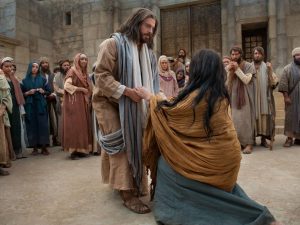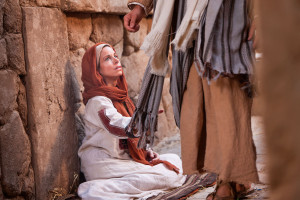 This is a remarkable Gospel – actually two blended stories – that unfold in a most interesting way. The story of Jesus healing the woman with the 12-year hemorrhages is sandwiched in the middle of the story of Jesus healing Jairus’ daughter. Seems a shame that lectors have the option of omitting the sandwiched story – the one about the lady with the 12-year hemorrhage.
This is a remarkable Gospel – actually two blended stories – that unfold in a most interesting way. The story of Jesus healing the woman with the 12-year hemorrhages is sandwiched in the middle of the story of Jesus healing Jairus’ daughter. Seems a shame that lectors have the option of omitting the sandwiched story – the one about the lady with the 12-year hemorrhage.
One common thread in the appeals for healing are made directly to Jesus IN DESPERATION. Jairus, one of the most important people in town, makes a scene in front of Jesus. The ill woman calls attention to herself when she replies to Jesus’ inquiry: “Who touched me.” It does not matter – they are desperate. Jesus is their ONLY and LAST HOPE.
“My little daughter is at the point of death. Come and lay your hands on her, so that she may be made well, and live.” And afterwards, when Jesus walks into the little girl’s room and heals her, Mark tells us that the first thing he did was: “He took her by the hand and said to her, “Telitha cum.” (“Little girl, get up!”) Jesus tells them to give her something to eat. This twelve year-old is, after all, a growing girl.
A similar thing happens when Jesus heals the woman suffering from hemorrhages. This time however notice that it is the woman herself who takes the initiative to get close enough to Jesus, saying: “If I but touch his clothes, I will be made well.” Is this not also the case today? This is not some kind of magic or superstition happening here. No! Rather, it is by now an established fact that when humans are appropriately touched the body releases healing endorphins by the pituitary gland. That is why some say we need at least ten hugs every day for our health and well-being.
In the case of the woman with the hemorrhages, after Jesus realized that someone in the crowd had touched him and power had gone forth from him, he wants to know who did touch him. The woman comes to him in fear and trembling. Her life would have been a very lonely one filled with one rejection after another. Like Jairus she comes directly to Jesus in despair, desperation and humility. The Cistercian abbot Eugene Boylan talks about humility this way: “Humility is the one thing we need, and Saint Benedict knew it. If you get humility, God can pour all his graces into your soul. Our Lord can live his life in you. God can look down at you in everything you do and say: “This is my beloved (Child), in whom I am well pleased….”
Another similarity is that in these stories Jesus speaks directly to those who are healed. He says nothing in response to the question posed about the woman by the religious leaders, but he does make a statement. He starts writing with his finger in the dirt. Slowly Jesus is left alone with the woman. Jesus stands up and says directly to the woman: “DAUGHTER, your faith has made you well; go in peace, and be healed.” Jesus concludes by blessing her with peace, which in the biblical sense, means complete health and wholeness, confirming to this new daughter, and to the crowd as well, that her disease had been healed completely.
Today we pray: Give us the insight, O God, to recognize your voice, to reach out in confidence for your healing touch and trustingly respond to your invitation: “Get up.” We say with the psalmist: “A great prophet has risen among us. The right hand of God feeds us; He answers al our needs. He is near to all who call upon him.”
~Reflection by Sister Roberta Bailey, OSB
Enjoy a peaceful, safe and enjoyable 4th of July!
Continue Reading







